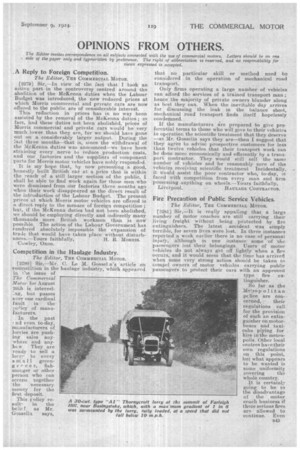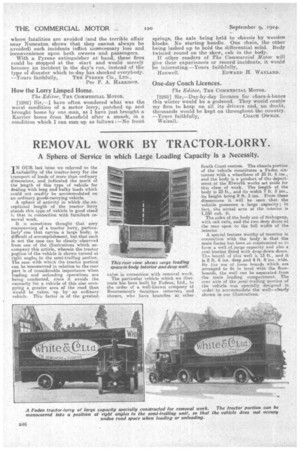OPINIONS FROM OTHERS.
Page 29

Page 30

If you've noticed an error in this article please click here to report it so we can fix it.
The Editor invites correspondence on all subjects connected with the use of commercial motors. Letters should be on one side of the paper only and typewritten by preference. The right of abbreviation is reserved, and no responsibility for views expressed is accepted.
.A Reply to Foreign Competition. • The Editor, THE COMMERCIAL MOTOR.
[2279] Sir,—In view of the fact that I took an active part in the controversy centred around the abolition of the McKenna duties when the Labour Budget was introduced, the new reduced prices at which Morris commercial and private cars are now offered to the public are of considerable interest.
This reduction in prices has in no way been assisted by the removal of the McKenna duties ; in fact, had these duties not been abolished, prices of Morris commercial and private cars would be very much lower than they are, for we should have gone out on a considerably larger output. During the last three months—that is, since the withdrawal of the McKenna duties was announced—we have been straining every nerve to reduce production costs, and our factories and the suppliers of component parts for Morris motor vehicles have nobly responded.
It is my hope that, by now presenting a good, honestly built British car at a price that is within the eeach of a still larger section of the public, shall be able to find work again for those men who were dismissed from Our factories three months ago when their work disappeared as the direct result of the introduction of the Labour Budget. The present prices at which Morris motor vehicles are offered is a direct reply to the menace of foreign competition ; but, if the McKenna duties had not been abolished, we should be employing directly and indirectly many thousands more British workmen than is now possible. The action of the Labour Government has rendered absolutely impossible the expansion of trade that would have taken place without disturb
ances.—Yours faithfully, H. It. MORRIS. CoWl ey, Oxon.
Competition in i he Haulage Industry.
The Editor, THE COMMERCIAL MOTOR. [2280] Sir,—Mr. Cl. Le M. Gossel n's article on competition in the haulage industry, whieh appeared in issue of The Commercial • Motor for August 26th is interest:ng, but passes over one cardinal fault in the pe'icyof manufacturers.
In the past :lid even to-day, manufacturers of lorries are pushine. sales anywhere and anyhi . They are ready to sell a lorry to every s in a 11 greengr, o c e r, fishmonger or other person who can scrape together the necessary money for the first deposit.
This rolicy resuite in the belic f. as Mr. Gosselia says, that no particular skill or method need be considered in the operation of mechanical road transport.
. Only firms operating a large number of vehicles can afford the services of a trained transport man ; hence the majority of private owners blunder along as best they can. When the inevitable day arrives for discussing the leak in the balance sheet, mechanical road transport finds itself hopelessly condemned.
If the manufacturers are prepared to give preferential terms to those Who will give to their vehicles in operation the scientific treatment that they deserve —as Mr. Gosselin says they are—then I suggest that they agree to advise prospective customers for less than twelve vehicles that their transport work can be done more economically and efficiently by a transport contractor. They would still sell the same number of vehicles and be reasonably sure of the vehicles receiving scientific treatment Incidentally, it would assist the poor contractor who, to-day, is faced with competition from every man and firm possessing anything on wheels.—Yours faithfully,
Liverpool. HAULAGE CONTRACTOR.
Fire Precaution of -Public. Service Vehicles. • The Editor, THE COMMERCIAL MOTOR.
[2281] Sir,—It is really appalling that alarge number of motor coaches are still carrying their living freight without being protected by fire extinguishers. The latest accident was simply terrible, for seven lives were lost. In three instances reported a week earlier there is no case of personal injury, although in one instance some of the passengers iost their belongings. Users of 'motor vehicles do not always get off lightly, when a fire occurs, and it would seem that the time has arrived when some very strong action should be taken to compel owners of motor vehicles carrying public passengers to protect their cars with an approved
type fire extinguisher.
So far as the Metropolitan pclice are con cerned, their regulations call for the provision of such an extinguisher on motorbuses and taxicabs plying for hire in the metropolis. Other local centres have their own regulations on this point, but what appears to be wanted is some uniformity covering the whole country.
It is certainly going to be to the disadvantage of the motor coach business if these serious fires are allowed to continue. Even where fatalities are avoided (and the terrible affair near Nuneaton shows that they cannot always be avoided) such incidents inflict umrecessary loss and inconvenience upon both owners and passengers.
With a Pyrene extinguisher at hand, these fires could be stopped at the start and would merely become an incident in the day's run, instead of the type of disaster which to-day has shocked everybody. --Yours faithfully, THE PYRENE LTD., Per F. A. Co.,lARRISON.
How the Lorry Limped Home.
The Editor, THE COMMERCIAL MOTOR.
[5.1282] Sir,—I have often wondered what was the worst condition of a motor lorry, patched up and brought home by one man, as I have just brought a Kamer home from Mansfield after a smash, in a condition which I can sum-up as follows :—No front springs, the axle being held to chassis by wooden blocks. No starting handle. One chain, the other being lashed up to hold the differential solid. Body twisted round on the skew, cab in the body. If other readers of The Commercial A f 0i01* will give their experiences or record incidents, it would be interesting.—Yours faithfully, Hanwell. EDWARD H. WAYLAND.
One-day Coach Licences.
The Editor, THE COMMERCIAL MOTOR.
r2283] Sir,—Day-by-day licences for chars-à-banes this winter would be a godsend. They would enable my firm to keep on all its drivers and, no clourit, thousands would be kept on throughout the country.
--Yours faithfully,
, COACH OWNER.
Walsall.
, COACH OWNER.
Walsall.
































